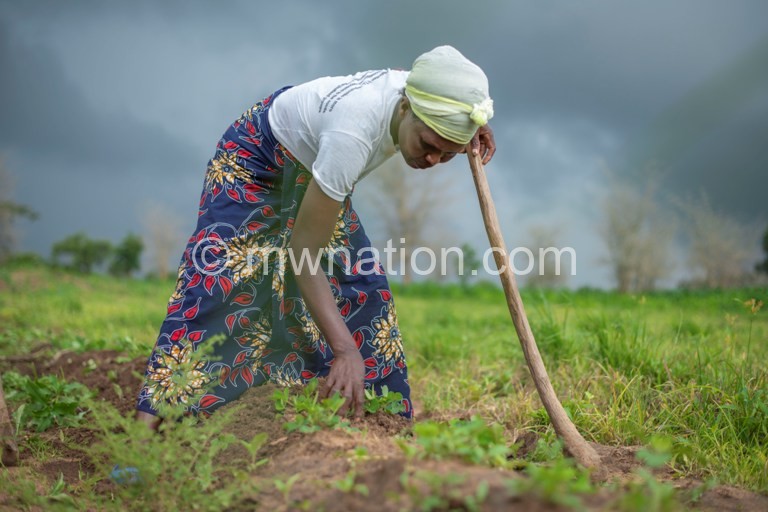Cushioning farmers from Covid-19
The Covid-19 pandemic discovered in China last December has disrupted social and economic activities worldwide.
In Malawi, where the coronavirus disease has claimed 59 lives from about 2 900 confirmed cases, the pandemic will most likely come in the way of farming, the lifeline of almost four in every five people.

The disruptions are expected to have profound negative effects on women, who constitute 70 percent of Africa’s agricultural labour force.
Women in Malawi are still in majority. According to the 2018 census, they, account for 51 percent of the population of 18 million.
As productivity chains and international trade in agricultural inputs get disrupted due to Covid-19, yields are likely to drop.
Without social safety nets, women, who rely on farming for subsistence living will bear the brunt.
With agriculture being the country’s economic mainstay, many women are hanging in there for an income.
That too will take a severe knock as production will be affected.
However, there is still hope for Malawian farmers especially those with organised production and marketing services.
There are 48 farmer organisations and cooperatives in Mchinji, Lilongwe and Mzimba supported by the UN Women three-year project contributing to the economic empowerment of Women in Malawi Through Climate Smart Agriculture.
Some 10 000 women in these groups have been equally affected by the pandemic though they have some relief along the way.
Standard Bank is funding the smart agriculture project, which focuses on groundnuts production, to the tune of K340 million to speed up progress towards achieving the global Sustainable Development Goals (SDGs) to end hunger, inequalities and poverty by 2030.
It particularly focuses on SDG2 on zero hunger, SDG5 on gender equality and SDG13 on reducing climate change and its harsh impacts.
To members of Gwiritse Cooperative in Nsaru, Lilongwe, the group offers them the ease to share modern farming strategies, collectively acquire farm inputs and bargain for better markets.
However, the farmers major distraction caused by the fast-spreading Covid-19 pandemic has only been failure to conduct meetings in big groups as in the past.
Cooperative manager Pyton Ngwira says despite the Covid-19 scare, the women farmers will still benefit from their yield as the cooperative has already secured a market for the produce.
He says: “We won’t feel too much strain because we have already secured a market for our produce as a cooperative.
“For some weeks now, we have been aggregating the harvest of our members. As we speak, we have given receipts to around 30 farmers who have deposited their produce at the warehouse.”
Ngwira’s cooperative has 242 members, including 152 women.
The first Covid-19 confirmed case in Malawi was detected on April 2, after the farmers had already undertaken all key farm activities such as planting and weeding.
Gwiritse Cooperative expected a combined harvest of 250 tonnes of groundnuts –an equivalent of 500 bags weighing 50 kilogrammes each– for the 2019/2020 growing season.
While there is optimism in terms of the harvest, these farmers, despite observing social distancing and hygiene when carrying out activities at the cooperative, might be exposed to the virus in other places due to prevailing cultural expectations and laxity in Covid-19 prevention.
In the country’s social and cultural context, women are often responsible for the care of children, the sick and elderly.
This makes them prone to Covid-19 exposure in their homes and other places.
“We keep reminding our members to observe all the preventive measures wherever they go and adhere to measures put in place by local and national government,” says Ngwira.
Such measures are also being coordinated by UN Women to all the cooperatives under the project to ensure that all the women farmers are safe from the outbreak.
However, these successes still exist within an economy still grappling to feed its population.
According to the Malawi Vulnerability Assessment Committee (Mvac), 1.8 million Malawians are already on the brink of facing hunger this year.
The Covid-19 pandemic is likely to compound the existing food shortage nationwide and it affects women and their families regardless of whether they are in a cooperative or not.
Women in the country are more strained from effects of the pandemic.
They require lasting solutions to a myriad of problems they face both in times of emergencies and normalcy. – Sam Mthambala Contributor





